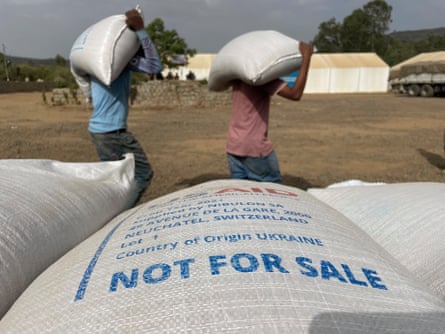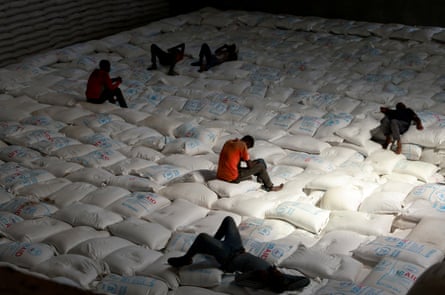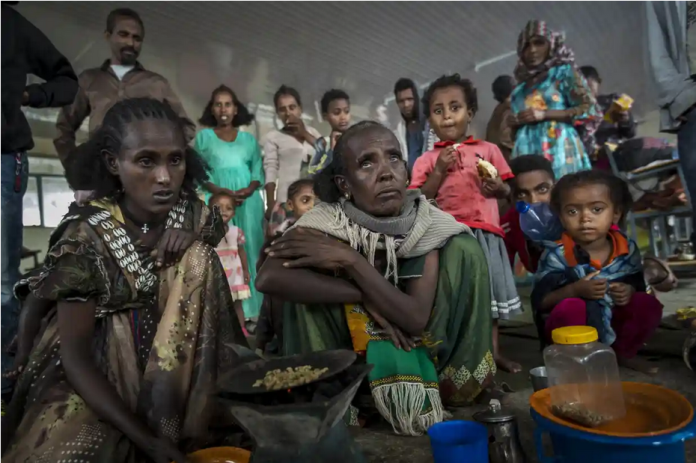Hunger-related deaths have risen since grain deliveries stopped after a nationwide scheme to steal supplies was exposed
Mulu Meresa does not know where her family’s next meal is coming from. Like the other 1.8 million people displaced by the recent war in Ethiopia’s northern Tigray region, she and her two children rely on grain distributed by humanitarian agencies.
But food deliveries stopped after aid workers uncovered a nationwide scheme to steal supplies meant for hungry people, and Mulu has received nothing since February.
“The hunger is very bad,” says Mulu, who has spent the last two and half years living in a school in Mekelle, Tigray’s capital. “I am very worried about my children. Are they going to die in my hands because of this lack of food?”
The UN and the US halted food assistance to Tigray in March while they investigated the theft. Earlier this month, they announced they were pausing food aid to the whole of the country, affecting 20.1 million Ethiopians who rely on donated grain because of drought and conflict.
The UN’s World Food Programme (WFP) and the US Agency for International Development (USAid) are still piecing together how much food was taken. While the true scale may never be known, aid workers briefed on the initial findings of the USAid investigation say the agency believes this could be the biggest ever theft of humanitarian food and that Ethiopian government officials are deeply involved.
“It’s systematic and it has been going on for a long, long time,” says a UN official, who adds that the theft appeared to be orchestrated at high levels of Ethiopia’s government.
Aid workers and diplomats told the Guardian that Ethiopian government officials inflated beneficiary lists and cited instances of armed actors seizing grain from warehouses. They also say the WFP and USAid failed to ensure their supplies went to intended recipients.

Several sources say that aid agencies have long known that corrupt Ethiopian officials were stealing donated food and they accepted this as the cost of operating in Ethiopia.
Ethiopia’s government plays a prominent role in the provision of aid. During the famine of 1984-5, the government and opposition rebels were accused of stealing aid.
“The Ethiopian government is very intrusive and we don’t have any independence to do the job we are here for,” says one aid worker. “We gave them the liberty to do what they wanted with the food. It was a perfect environment for aid diversion, and we created it.”
This view is shared by other aid workers in Addis Ababa, the Ethiopian capital. “This is a system everyone supported for decades, donors and partners alike,” says one. “The scale is only new because they didn’t do anything about it. They left it to fester.”
A spokesperson for WFP refused to specify who was responsible for the theft, but says the amount of food stolen was “significant”. Much of the theft had occurred “post-distribution – meaning after the assistance has been handed to the beneficiary”. These supplies then found their way on to markets.
“It is WFP’s job to strengthen our mechanisms to make sure it doesn’t happen again,” the spokesperson says. USAid did not respond to a request for an interview or to a written set of questions.

Throughout the two-year war in Tigray, which ended in November, both sides were accused of stealing humanitarian supplies and restricting aid access to the region. The government was accused of using hunger as a weapon and hundreds of thousands of people were pushed to the brink of famine.
The local government in Tigray says 7,000 tonnes of grain – enough to feed almost half a million people for a month – have been stolen by federal and regional officials and others. It has also reported hundreds of deaths since March. Other regions are yet to say how much grain was taken in their areas.
An aid worker says they had received reports of dozens of starvation-related deaths linked to the aid pause in the western region of Benishangul-Gumuz, the site of an ethnic insurgency.
Hewan Abraha, who has children aged two and four, says she often goes for a day without eating.
“The aid was just stopped without warning,” says Hewan, who lives in the displacement camp in Mekelle. “They didn’t give us any detailed information. We don’t know when it will start again. It is similar to the time of the conflict.”
Gidey Adhana, another displaced person from western Tigray, now in Mekelle, has been surviving on handouts of surplus grain from family members who own a farm near the city. He says he is lucky, as this option is not available to other people in the camp. They have been reduced to begging for food.
“We are very angry food aid has been stopped,” Gidey says. “We blame the government and the aid agencies. They should have monitored this and been more careful. Why are we being punished? It is not our fault.”

As well as the 20.1 million Ethiopians who need aid, more than 823,000 overseas refugees in Ethiopia, mostly from South Sudan, Somalia and Eritrea, are not receiving any grain.
USAid and WFP are still running “limited” nutrition programmes for children and mothers. In Tigray, only 256,000 of the 809,000 people who need nutritional support received it between January and May.
The WFP says it hopes to resume food aid deliveries by the end of July. Both it and USAid are insisting that the government doesn’t compile beneficiary lists and that biometric checks are introduced.
“We were self-sufficient people before the war in our homeland,” says Mulu. “Now we are living with hunger and are just waiting for the food aid to start again. We have nothing.”
The Guardian in Ethiopia





























